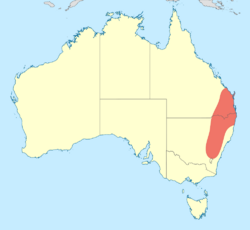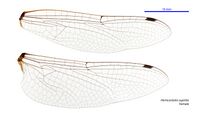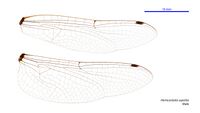Biology:Hemicordulia superba
From HandWiki
Short description: Species of dragonfly
| Superb emerald | |
|---|---|
| Scientific classification | |
| Domain: | Eukaryota |
| Kingdom: | Animalia |
| Phylum: | Arthropoda |
| Class: | Insecta |
| Order: | Odonata |
| Infraorder: | Anisoptera |
| Family: | Corduliidae |
| Genus: | Hemicordulia |
| Species: | H. superba
|
| Binomial name | |
| Hemicordulia superba | |

| |
Hemicordulia superba is a species of dragonfly in the family Corduliidae,[3] known as the superb emerald.[4] It inhabits rivers, pools and lakes in south-eastern Queensland and northern New South Wales in Australia.[5]
Hemicordulia superba is a small to medium-sized, black and yellow dragonfly with long legs. In both males and females the inboard edge of the hindwing is rounded.[6]
Gallery
See also
- List of dragonflies of Australia
References
| Wikimedia Commons has media related to Hemicordulia superba. |
- ↑ Dow, R.A. (2017). "Hemicordulia superba". IUCN Red List of Threatened Species 2017: e.T87533825A87534101. doi:10.2305/IUCN.UK.2017-1.RLTS.T87533825A87534101.en. https://www.iucnredlist.org/species/87533825/87534101. Retrieved 20 November 2021.
- ↑ Tillyard, R.J. (1911). "Further notes on some rare Australian Corduliinae, with descriptions of new species". Proceedings of the Linnean Society of New South Wales 36: 366–387 [368]. doi:10.5962/bhl.part.21904. https://www.biodiversitylibrary.org/page/3351091.
- ↑ "Species Hemicordulia superba Watson, 1969". Australian Biological Resources Study. 2012. https://biodiversity.org.au/afd/taxa/Hemicordulia_superba.
- ↑ Theischinger, Günther; Hawking, John (2006). The Complete Field Guide to Dragonflies of Australia. Collingwood, Victoria, Australia: CSIRO Publishing. pp. 248. ISBN 978-0-64309-073-6.
- ↑ Theischinger, Gunther; Endersby, Ian (2009). Identification Guide to the Australian Odonata. Department of Environment, Climate Change and Water NSW. pp. 218. ISBN 978-1-74232-475-3.
- ↑ Watson, J.A.L.; Theischinger, G.; Abbey, H.M. (1991). The Australian Dragonflies: A Guide to the Identification, Distributions and Habitats of Australian Odonata. Melbourne: CSIRO. ISBN 0643051368.
Wikidata ☰ Q2648222 entry
 |




